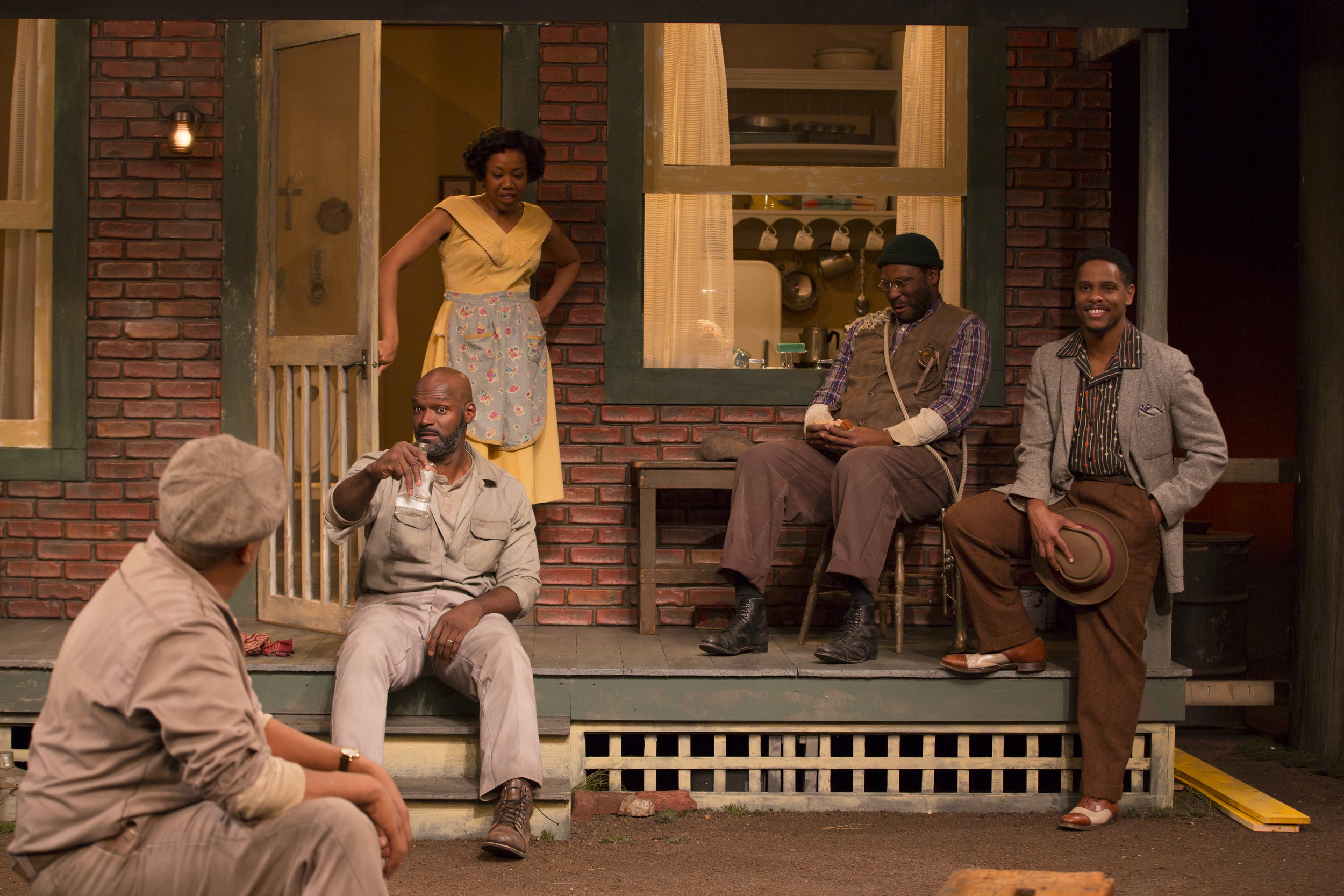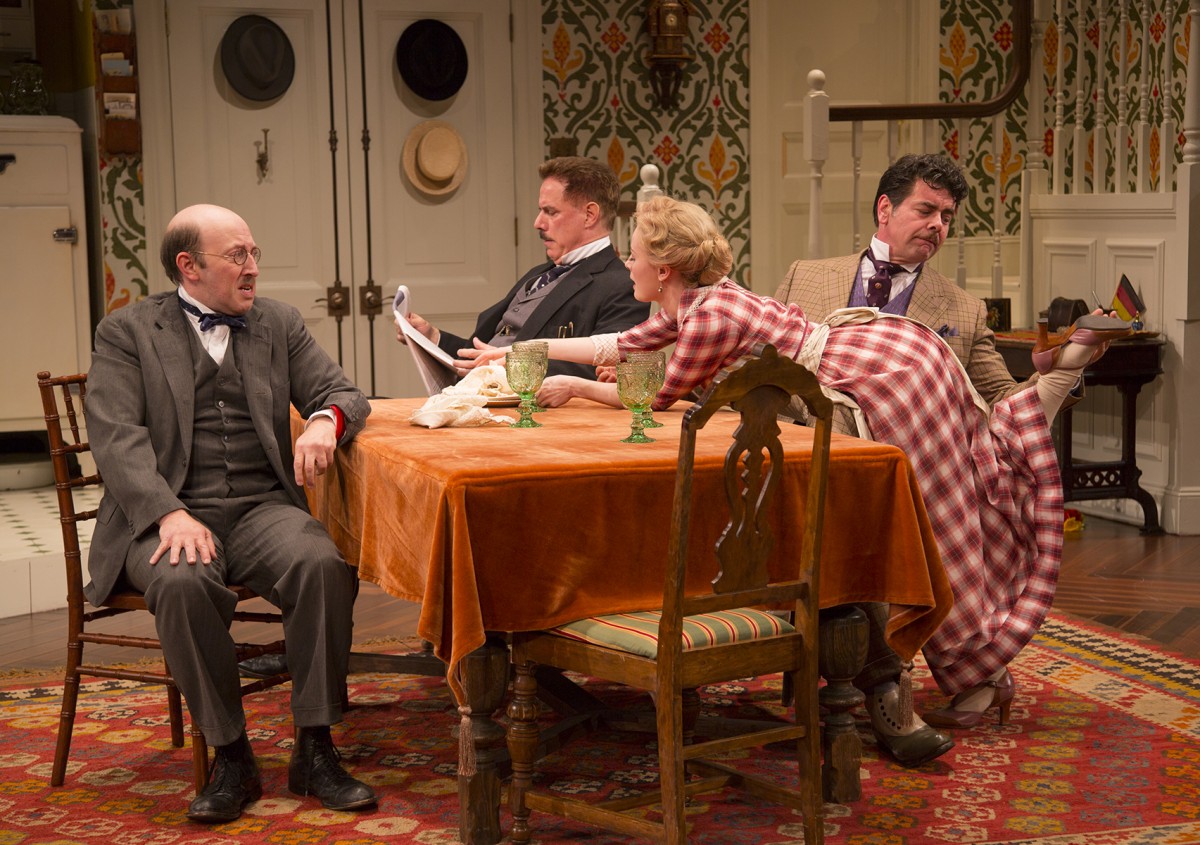August Wilson’s Pulitzer-winning Fences, directed by Phylicia Rashad and playing at the Long Wharf Theatre, is a winner all the way. Wilson’s script has the resonance and depth one finds in great novels and in the landmark works of naturalist theater. Character-driven and language-based, it’s a play that is larger than life only in the sense that it might feel, while you’re watching it, more real than your own life. For this is slice-of-life drama with no expressionistic extremes of behavior, no tragic inflation or comic exaggeration. Wilson’s command of his characters and Rashad’s command of her actors combine to create great drama—involving, entertaining, full of wisdom and the true contradictions found in real life. Start with that set by John Iacovelli. Even before the play opens, we sit looking at the backyard of the home of Troy and Rose Maxson, located in the Hill District of Pittsburgh, where Wilson hailed from, in the 1950s. It’s homey, inviting even. No, it’s not a grand structure, nor is it ramshackle. It’s not poor, nor is it middle-class. The house, the porch, the tree in the yard—it all feels lived in and unapologetic. Folks can drop in, no problem.
Troy, the master of this home, is a big man with well-defined, even classical features. He’s the kind of barely educated workingman who exudes amazing amounts of charisma. There’s nothing phoney about him in the least, no effort to be something he’s not. What he is is a good friend to his old army—and drinking—buddy, Jim Bono, and a doting husband to his wife, though his doting takes the form of the condescension to women common among breadwinning males in that day and age. He rules the roost, but generally strives to stay in her good graces. And, when we first meet them, Troy and Rose seem as happy as any two people married for over seventeen years could expect to be.
And yet. The dramatic conflicts in the play all come from Troy’s own nature. Wilson provides a character study that is relentless in revealing—simply through speech with others—everything we need to know about Troy Maxson; indeed we learn everything the man knows about himself. For Troy was a gifted baseball player before blacks were allowed in the professional leagues, and the chip he carries on his shoulder from that fact poisons his relation to Cory, the teenaged son he fathered with Rose. We also learn, from his attitude to Lyons, his elder son from a previous relationship, that his past is full of things he’d rather not be reminded of, but which he reveals to Lyons in a gripping speech about his life as a thief. Later, a larger confession materializes that serves to poison his relationship with his supportive wife. Along the way, we hear about how some decisions Troy made affect his brother Gabriel, a vet damaged by the war, whose relief money is the basis of Troy’s financial well-being.
In other words, Troy is nothing if not imperfect. He is so deeply flawed and yet so fully alive that we have no choice but to see his point of view, primarily because his failings are obvious to himself even if he tries to talk his way to justifications. We might say he’s “all talk,” except that Esau Pritchett gives Troy such earnest soul, and a presence of mind that refuses to be glib simply for its own sake. Even when he tells facetious tall tales about meeting Death or finding the Devil at his door, offering him credit terms, his way with a story—placing himself always as the hero tried by external forces—carries with it a convincing moral resonance. Even when he’s fooling around, he’s not just fooling around.
And when he’s in deadly earnest, he can be truly scary, a father whose sense of his obligations and of his manhood are utterly unselfconscious about how overbearing he is and how—in refusing to let Cory play football, in never going to hear Lyons play jazz, in not doing more for his brother, in having a mistress—often he is wrong. Much of the play’s power derives from showing this man as he is—without irony or ridicule or sentimentality. Troy is no Lear and his bad decisions don’t destroy a kingdom or anyone’s life, ultimately—though they do cause pain—but he is just as much a figure for the self-delusions and insecurities and abundance of what can justifiably be called “the masculine principle.”
One of the wonders of the play is its language—it’s a natural-sounding speech that is yet very musical, full of rhythms that sound “easy” but are actually hard to get right. The cast does a splendid job with the text and everyone deserves credit for their work. From little Taylor Dior, the child who plays Raynell with artless sincerity, to Chris Myers as Cory, who struggles with his father without sounding petulant and who acquits himself well in the emotionally charged singing of his grand-dad’s song about a dog called Blue late in the play, to Jared McNeill as Lyons, a nuanced performance that conveys effectively the note of a different kind of male—the hepcat or hipster of the fifties—who condescends to his father but also wants his respect, to Phil McGlaston as Jim Bono, the neighborly crony who registers both genial acceptance of Troy as well as a distance that comes later, to G. Alvarez Reid as Gabriel, Troy’s wounded brother who stirs guilt (watch Troy’s face whenever he shows up), remorse, and brings with him visions of St. Peter’s gate and hellhounds, to Portia as Rose, who delivers two quite affecting arias—the first, to Troy, is a rhapsody of betrayed love and deep accusation that Portia does full justice to; the other, to Cory, a proud defense of her deceased husband that feels only slightly more mannered than it might; to Esau Pritchett as Troy, a commanding performance that lets us feel the fearsome self-possession of a man who can’t ever admit he’s wrong.
And is he? One of the interesting aspects of Fences is that Troy does have a vision of life that he intends as the best for all. It’s self-serving, but that doesn’t mean it’s misguided. Would Corey’s football-playing plans have panned out? We don’t know. Is it wrong to have children with three different women? Wrong to the women, certainly, but wrong to the children? The final scene makes us feel the purpose of the father, even in his absence. All are indebted to him, at some level, simply by being there. And that’s because Wilson wants to respect men like Troy—denied the chance to be their best because of racism, and yet able to rise up from the lowest job to the job of driver, normally reserved for white men, without even having a driver’s license. Like Arthur Miller’s Willy Loman, Troy is a man his sons find hard to love, but who is loved deeply by his author, flaws and all. Troy is the hero of his own life, and Wilson, in Rashad’s compassionate production, lets us see what a burden that can be.
This Fences is the real deal. Go!
August Wilson’s Fences Directed by Phylicia Rashad
Scenic Design: John Iacovelli; Costume Design: Esosa; Lighting Design: Xavier Pierce; Sound Design: John Gromada; Hair & Wig Design: J. Jared Janas & Rob Greene; Fight Diretor: Michael Rossmy; Production Stage Manager: David Blackwell; Assistant Stage Manager: Amy Patricia Stern; Casting by Calleri Casting; Photographs by T. Charles Erickson
Long Wharf Theatre November 27-December 22, 2013



